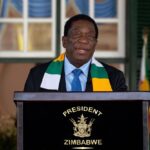Harare – A palpable tension gripped the Zanu PF politburo meeting yesterday as President Emmerson Mnangagwa subtly launched an attack on a faction within the ruling party that is believed to be backing his deputy, Constantino Chiwenga.
However, Mnangagwa’s address was met with lukewarm cheers, and Chiwenga remained notably stone-faced, refraining from nodding or cheering in support, a stark contrast to his usual behaviour at politburo meetings.
“As Zanu PF is a colossal revolutionary party, we have a job to do and a vision to deliver for the good of the people of our great motherland, Zimbabwe,” Mnangagwa declared as other party members clapped, while Chiwenga offered only a single clap.
“I applaud all my fellow citizens from across the country, for their clarity, national consciousness and patriotism that continue to squash efforts by malcontents and rogue delusional elements bent on disturbing our peace, unity and harmony. Pasi navo (down with them),” he continued.
“Our motherland, Zimbabwe, will forever be a constitutional democracy and sovereign nation, with all of us living in unity, peace and harmony,” Mnangagwa added. “They can continue barking, but Zimbabwe will go on.” Again, a section of the politburo members clapped, but Chiwenga remained unmoved.
“Zanu PF is an unstoppable train,” Mnangagwa continued. “Zanu PF is a moving train. In Zanu PF, we follow the party constitution, all the time, in the morning, afternoon and at night. Our party constitution is sacred, it is like roots and the trunk of a tree and the members are its branches. As with any other revolution, those who do not toe the correct line of the revolution must fall by the wayside.”
The undercurrent of unease within the ruling party comes as the government has backtracked on its earlier hard-line stance declaring war against vendors, amid fears of a mass uprising in the face of planned March 31 nationwide protests. These protests are reportedly being organised by a Zanu PF faction opposed to plans to extend Mnangagwa’s rule beyond 2028.
Local Government minister Daniel Garwe initially stated that councils would be supported by law enforcement agents in a blitz meant to sanitise cities and towns.
However, yesterday, Mnangagwa met with vendor representatives at State House, where he announced a change of tact following widespread criticism of the blitz.
“It is important that you undertake your trade in an orderly manner, respecting those that operate around you and the broader environment and community where you operate,” he said. “We must have order and as responsible citizens, we should never gloss over this matter. We must be honest that we cannot let the state of our country degenerate right in our eyes.”
Addressing journalists after Mnangagwa’s meeting with vendors, Garwe appeared to have had a volte-face, stating that the government had resolved to improve its relationship with the vendors.
“The municipal police must stop harassing vendors,” Garwe said. “There are better ways of communicating. Harassing is not the best way of communicating. The ministry will now take leadership in reining in all local authorities that are inflicting pain on vendors.”
Garwe, however, clarified that night vending remained banned. “We must improve the relationship between the vendors and the various local authorities in the country,” he said. “We must involve the vendors in the revision of bylaws or preparation of any new bylaws. This was a topical issue.”
The government’s initial decision to crack down on vendors sparked fears of nationwide unrest, particularly given the rising political temperatures in the country over the planned March 31 protests. There was widespread speculation that the crackdown was a pre-emptive strategy ahead of the protests, where organisers are citing dissatisfaction with Mnangagwa’s rule.
Adding to the pressure on Mnangagwa’s government, nurses in Harare staged a protest last week over a range of grievances. University lecturers were also set to begin strike action on Monday, but the parent ministry intervened at the last minute.
Teachers, however, have threatened to down tools beginning tomorrow in protest over poor working conditions. The strike, initiated by the Amalgamated Rural Teachers Union of Zimbabwe (Artuz), is being supported by the Zimbabwe National Students Union, Progressive Teachers Union of Zimbabwe (PTUZ), Zimbabwe Solidarity Movement and Educators Union of Zimbabwe.
“We, the educators, parents, students and citizens of Zimbabwe, united under Vashandi and the Zimbabwe Solidarity Movement, condemn the deliberate neglect and under-funding of our education system,” they said in a joint statement. “Schools are crumbling, teachers face starvation wages and students are denied their right to learning. In solidarity with our affiliates, Artuz call for a teachers’ strike and in response to years of government inaction, we hereby declare March 28, 2025, a national day of action for education.”
PTUZ president Takavafira Zhou said the union had had enough of unfulfilled promises made by the government. “What is emerging from our consultations is the need for a united front of all civil servants in order to knock sense to the arrogant employer and government,” he said. “We refuse to continue wallowing in poverty in a country with abundant natural resources that can guarantee better livelihoods for all Zimbabweans if tapped and harnessed properly.”
Zimbabwe Teachers Association secretary-general Goodwill Taderera, however, said union members would not participate in the protest. “As far as the Zimbabwe Teachers Association is concerned, we have not planned anything yet,” he said. “I’m aware that there is going to be a workshop from the 1st to the 5th in Bulawayo organised by the Public Service Commission and this includes the National Joint Negotiating Committee members.”











